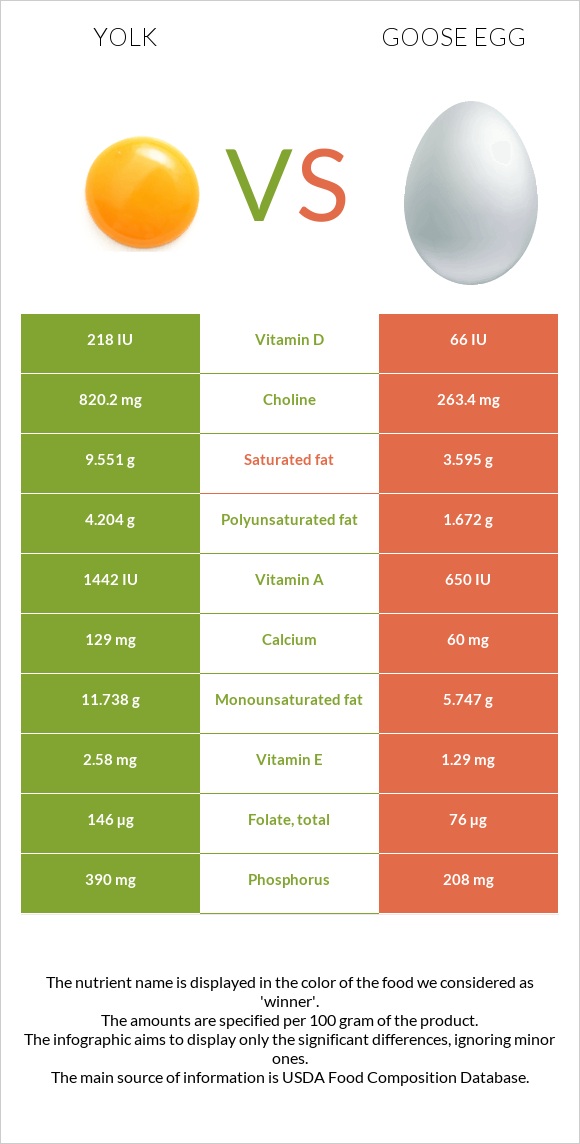Yolk vs. Goose egg — In-Depth Nutrition Comparison
Compare
The main differences between yolk and goose eggs
- Yolk is richer in choline, selenium, phosphorus, vitamin D, vitamin B5, folate, and vitamin A, yet goose eggs are richer in vitamin B12.
- Daily need coverage for vitamin B12 for goose eggs is 131% higher.
- Yolk contains 3 times more vitamin D than goose eggs. Yolk contains 218 IU of vitamin D, while goose eggs contain 66 IU.
- Goose eggs contain less saturated fat.
Food types used in this article are Egg, yolk, raw, fresh and Egg, goose, whole, fresh, raw.
Infographic

Infographic link
Mineral Comparison
Mineral comparison score is based on the number of minerals by which one or the other food is richer. The "coverage" charts below show how much of the daily needs can be covered by 300 grams of the food.
| Contains more CalciumCalcium | +115% |
| Contains more CopperCopper | +24.2% |
| Contains more ZincZinc | +72.9% |
| Contains more PhosphorusPhosphorus | +87.5% |
| Contains less SodiumSodium | -65.2% |
| Contains more ManganeseManganese | +44.7% |
| Contains more SeleniumSelenium | +51.8% |
| Contains more MagnesiumMagnesium | +220% |
| Contains more PotassiumPotassium | +92.7% |
| Contains more IronIron | +33.3% |
Vitamin Comparison
Vitamin comparison score is based on the number of vitamins by which one or the other food is richer. The "coverage" charts below show how much of the daily needs can be covered by 300 grams of the food.
| Contains more Vitamin AVitamin A | +103.7% |
| Contains more Vitamin EVitamin E | +100% |
| Contains more Vitamin DVitamin D | +217.6% |
| Contains more Vitamin B1Vitamin B1 | +19.7% |
| Contains more Vitamin B2Vitamin B2 | +38.2% |
| Contains more Vitamin B5Vitamin B5 | +70% |
| Contains more Vitamin B6Vitamin B6 | +48.3% |
| Contains more Vitamin KVitamin K | +75% |
| Contains more FolateFolate | +92.1% |
| Contains more Vitamin B3Vitamin B3 | +687.5% |
| Contains more Vitamin B12Vitamin B12 | +161.5% |
All nutrients comparison - raw data values
| Nutrient |  |
 |
DV% diff. |
| Vitamin B12 | 1.95µg | 5.1µg | 131% |
| Choline | 820.2mg | 263.4mg | 101% |
| Cholesterol | 1085mg | 852mg | 78% |
| Selenium | 56µg | 36.9µg | 35% |
| Saturated fat | 9.551g | 3.595g | 27% |
| Phosphorus | 390mg | 208mg | 26% |
| Vitamin B5 | 2.99mg | 1.759mg | 25% |
| Vitamin A | 381µg | 187µg | 22% |
| Fats | 26.54g | 13.27g | 20% |
| Vitamin D | 218 IU | 66 IU | 19% |
| Vitamin D | 5.4µg | 1.7µg | 19% |
| Folate | 146µg | 76µg | 18% |
| Polyunsaturated fat | 4.204g | 1.672g | 17% |
| Monounsaturated fat | 11.738g | 5.747g | 15% |
| Iron | 2.73mg | 3.64mg | 11% |
| Vitamin B2 | 0.528mg | 0.382mg | 11% |
| Zinc | 2.3mg | 1.33mg | 9% |
| Vitamin E | 2.58mg | 1.29mg | 9% |
| Vitamin B6 | 0.35mg | 0.236mg | 9% |
| Calories | 322kcal | 185kcal | 7% |
| Calcium | 129mg | 60mg | 7% |
| Protein | 15.86g | 13.87g | 4% |
| Sodium | 48mg | 138mg | 4% |
| Magnesium | 5mg | 16mg | 3% |
| Potassium | 109mg | 210mg | 3% |
| Copper | 0.077mg | 0.062mg | 2% |
| Vitamin B1 | 0.176mg | 0.147mg | 2% |
| Carbs | 3.59g | 1.35g | 1% |
| Manganese | 0.055mg | 0.038mg | 1% |
| Vitamin B3 | 0.024mg | 0.189mg | 1% |
| Net carbs | 3.59g | 1.35g | N/A |
| Sugar | 0.56g | 0.94g | N/A |
| Vitamin K | 0.7µg | 0.4µg | 0% |
| Tryptophan | 0.177mg | 0.282mg | 0% |
| Threonine | 0.687mg | 0.797mg | 0% |
| Isoleucine | 0.866mg | 0.647mg | 0% |
| Leucine | 1.399mg | 1.188mg | 0% |
| Lysine | 1.217mg | 1.03mg | 0% |
| Methionine | 0.378mg | 0.624mg | 0% |
| Phenylalanine | 0.681mg | 0.91mg | 0% |
| Valine | 0.949mg | 0.958mg | 0% |
| Histidine | 0.416mg | 0.346mg | 0% |
| Fructose | 0.07g | 0% | |
| Omega-3 - EPA | 0.011g | 0g | N/A |
| Omega-3 - DHA | 0.114g | 0g | N/A |
Macronutrient Comparison
Macronutrient breakdown side-by-side comparison
| Contains more ProteinProtein | +14.3% |
| Contains more FatsFats | +100% |
| Contains more CarbsCarbs | +165.9% |
| Contains more OtherOther | +57.4% |
| Contains more WaterWater | +34.6% |
Fat Type Comparison
Fat type breakdown side-by-side comparison
| Contains more Mono. FatMonounsaturated fat | +104.2% |
| Contains more Poly. FatPolyunsaturated fat | +151.4% |
| Contains less Sat. FatSaturated fat | -62.4% |




